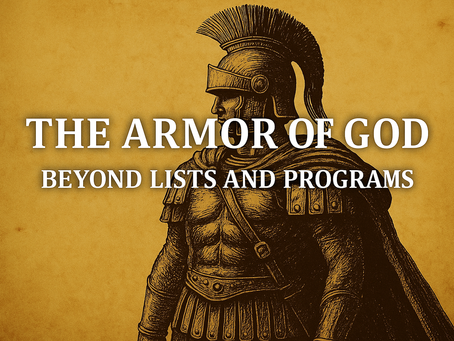top of page


If Anger Is a Sin, Why Did Saul Get Angry When the Spirit Came Upon Him?
If Anger Is a Sin, Why Did Saul Get Angry When the Spirit Came Upon Him? Scripture does not give us the luxury of easy categories when it comes to anger. On one hand, anger is repeatedly warned against as spiritually dangerous and often sinful. On the other, the Bible records moments where anger appears alongside God’s active work—nowhere more uncomfortably than in the rise of Saul.
4 min read


Anointing and Spirit — From Saul to David. When God Chooses the King Before the Crown
Anointing and Spirit — From Saul to David. When God Chooses the King Before the Crown. Few moments in Scripture are as sobering—and as instructive—as the quiet transfer of divine favor from one leader to another. There is no coup, no rebellion, no public announcement. Saul remains on the throne. The nation still sees him as king. Yet in the unseen realm, everything has already changed.
4 min read


Eldad & Medad: Spirit-Filled Prophets in the Camp
Eldad & Medad: Spirit-Filled Prophets in the Camp. Eldad and Medad were two of the seventy elders chosen to help Moses carry the burden of leadership in the wilderness. Their unexpected prophesying inside the camp reveals God’s freedom to pour out His Spirit wherever He chooses.
2 min read


Bezalel and the First Filling of the Spirit: God’s Blueprint for Creativity
Bezalel and the First Filling of the Spirit: God’s Blueprint for Creativity. When most people think of being filled with the Holy Spirit, they imagine preaching, miracles, or bold evangelism. Yet the first person Scripture describes as “filled with the Spirit” was not a prophet or a priest, but an artist and craftsman. Bezalel’s calling to build the tabernacle shows that God delights in creativity and equips His people to reflect His beauty.
2 min read


Is Prophesy for Today? A Biblical Case for Continuing Prophecy
Is Prophesy for Today? A Biblical Case for Continuing Prophecy. Prophecy is one of the most debated gifts in the church today. Some claim that prophecy ended with the apostles, while others insist it continues in full force. Yet the real question is not what traditions say, but what Scripture itself teaches. The Bible not only affirms prophecy in the New Testament church but also instructs believers how to discern and test it.
4 min read


Are There Many Gods or One?
Are There Many Gods or One? From ancient times to the present, humanity has wrestled with the question: are there many gods or one? The Bible gives a definitive answer: there is only one true God, who alone is worthy of worship. Yet throughout history, polytheism—the belief in many gods—has lured nations and even the people of God themselves into error. This question is not only theological but practical: what we believe about God shapes how we live, worship, and trust.
5 min read


Have the Gifts Ceased? A Biblical and Historical Case for Their Continuance
Have the Gifts Ceased? A Biblical and Historical Case for Their Continuance. The debate over spiritual gifts is not new. For centuries, some Christians have argued that miraculous gifts—prophecy, tongues, healing—ceased after the age of the apostles. This view, called Cessationism, is still held by several denominations today. Others, known as Continuationists, believe the gifts remain active until Christ returns.
4 min read


The Tower of Babel and the Connection to Pentecost: A Reversal
The Tower of Babel and the Connection to Pentecost: A Reversal. The Tower of Babel is one of the Bible’s most famous stories, often used to explain the origin of different languages and the scattering of nations. But its significance runs deeper than a tale of human pride. When set alongside the New Testament account of Pentecost in Acts 2, Babel and Pentecost form a powerful contrast — one showing the division caused by sin, the other revealing the unity created by the Spiri
3 min read


Ecclesiology: What Is the Church?
Ecclesiology: What Is the Church? Ecclesiology is the doctrine of the church. The Greek word ἐκκλησία (ekklēsia) literally means assembly or called-out ones. It was used in the ancient world for gatherings of citizens but was adopted by the New Testament to describe the people of God. The church is not a building or an institution but the redeemed community called out by Christ.
2 min read


The Fivefold Ministry: Gifts, Not Programs
The Fivefold Ministry: Gifts, Not Programs. Many churches today use the phrase “fivefold ministry” to describe the list of gifts Paul gives in Ephesians 4:11: apostles, prophets, evangelists, pastors, and teachers. Whole programs have been built around this idea, sometimes even marketed as if the Christian life could be managed through leadership formulas. Yet this misses Paul’s intent.
4 min read


Who Wrote Hebrews? A Scholarly Examination of an Ancient Question
Who Wrote Hebrews? A Scholarly Examination of an Ancient Question. The Epistle to the Hebrews is one of the most sophisticated writings in the New Testament. It combines an unparalleled mastery of the Greek Old Testament (Septuagint) with exalted Christology and pastoral exhortation. Yet, unlike Paul’s letters, it bears no opening salutation or claim of authorship. From the second century until now, scholars and church leaders have wrestled with the question: who wrote Hebrew
5 min read


The Trinity: The God Who Is Three-in-One
The Trinity: The God Who Is Three-in-One. The doctrine of the Trinity stands as one of the central mysteries of the Christian faith. It is not a philosophical abstraction but the reality of God as revealed in Scripture: Father, Son, and Holy Spirit — three distinct persons, yet one God. The term Trinity (trias in Greek, trinitas in Latin) does not appear in the Bible, but the reality saturates both Old and New Testaments.
5 min read


Anxiety and the Christian Life: Wrestling with Paul, Jesus, and Reality
Anxiety and the Christian Life: Wrestling with Paul, Jesus, and Reality. One of the most quoted verses in Philippians is Paul’s admonition: “Do not be anxious about anything” (Phil. 4:6). Many Christians take this as a command, and when they inevitably feel anxious, they experience guilt on top of their worry. But what did Paul actually mean? And how does this line harmonize with the rest of Scripture — especially considering that both Paul and Jesus themselves experienced de
3 min read


Book of Philippians Summary: Joy in Christ Amid Chains
Book of Philippians Summary: Joy in Christ Amid Chains. The letter to the Philippians is often called Paul’s “letter of joy,” but that joy is no shallow optimism. It was written from prison, under chains, with the real possibility of death ahead. Despite those circumstances, Paul presents one of the most uplifting and Christ-centered writings in the New Testament. Philippians reveals what true Christian joy looks like: not rooted in circumstances, but in Christ Himself.
4 min read


The Armor of God: Beyond Lists and Programs
The Armor of God: Beyond Lists and Programs. Few passages in Paul’s letters capture the imagination like Ephesians 6:10–18, where he calls believers to “put on the full armor of God.” For centuries, Christians have drawn strength from the imagery of helmets, shields, and swords. Yet too often, this has been reduced to a rigid checklist or a “spiritual warfare program,” as if Paul intended a formula for battle.
4 min read


Book of Ephesians Summary: The Church in Christ
Book of Ephesians Summary: The Church in Christ. Ephesians is Paul’s grand vision of the church — not as an institution, but as the body of Christ, chosen before creation, redeemed by His blood, and empowered by the Spirit. Where Galatians thunders against false gospels, Ephesians soars in worshipful praise and cosmic perspective. It lifts believers’ eyes to God’s eternal plan in Christ, then brings that vision down into practical instructions for daily life.
6 min read


The Fruit of the Spirit vs. the Sin of the Flesh: Evidence of Salvation
The Fruit of the Spirit vs. the Sin of the Flesh: Evidence of Salvation. The Christian life is not defined merely by what we claim with our lips but by what is produced in our lives. Jesus said, “You can identify them by their fruit, that is, by the way they act… A good tree can’t produce bad fruit, and a bad tree can’t produce good fruit.” (Matt. 7:16, 18, NLT). Paul echoes this in Galatians 5, contrasting the works of the flesh with the fruit of the Spirit.
3 min read


Book of Galatians Summary: Freedom in Christ
Book of Galatians Summary: Freedom in Christ. The letter to the Galatians is Paul at his most fiery and passionate. Written to a group of churches in the Roman province of Galatia, it tackles a crisis: false teachers had infiltrated, insisting Gentile believers must obey the Jewish law — especially circumcision — in order to be saved. Paul responds with urgency: salvation comes by grace through faith in Christ, not by works of the law.
5 min read


Saying “Jesus is Lord”: Spirit, Rhetoric, and Reality
Saying “Jesus is Lord”: Spirit, Rhetoric, and Reality. In 1 Corinthians 12:3, Paul makes a striking claim: “No one can say, ‘Jesus is Lord,’ except by the Holy Spirit.” At first glance, this raises questions. People can mouth those words today without any transformation. Even Jesus Himself warned: “Why do you call me ‘Lord, Lord,’ and not do what I say?” (Luke 6:46).
3 min read


Book of Acts Summary: The Gospel in Motion
Book of Acts Summary: The Gospel in Motion. The Book of Acts is the sequel to Luke’s Gospel, written by the same author and addressed again to Theophilus. If the Gospels record what Jesus began to do and teach, Acts shows what He continues to do through His Spirit-empowered church. It is the story of the gospel moving from Jerusalem to the ends of the earth, carried by apostles, martyrs, and missionaries.
4 min read
bottom of page